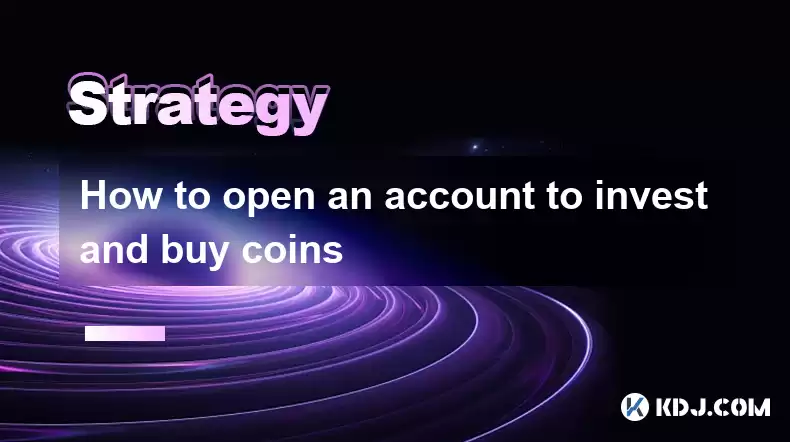-
 bitcoin
bitcoin $87959.907984 USD
1.34% -
 ethereum
ethereum $2920.497338 USD
3.04% -
 tether
tether $0.999775 USD
0.00% -
 xrp
xrp $2.237324 USD
8.12% -
 bnb
bnb $860.243768 USD
0.90% -
 solana
solana $138.089498 USD
5.43% -
 usd-coin
usd-coin $0.999807 USD
0.01% -
 tron
tron $0.272801 USD
-1.53% -
 dogecoin
dogecoin $0.150904 USD
2.96% -
 cardano
cardano $0.421635 USD
1.97% -
 hyperliquid
hyperliquid $32.152445 USD
2.23% -
 bitcoin-cash
bitcoin-cash $533.301069 USD
-1.94% -
 chainlink
chainlink $12.953417 USD
2.68% -
 unus-sed-leo
unus-sed-leo $9.535951 USD
0.73% -
 zcash
zcash $521.483386 USD
-2.87%
How to open an account to invest and buy coins
By meticulously researching cryptocurrency exchanges, verifying your identity, implementing security measures, funding your account, and selecting desired coins, you can effortlessly open a crypto-trading account and begin your investment journey.
Jan 08, 2025 at 05:38 pm

How to Open an Account to Invest and Buy Coins: A Comprehensive Guide
IntroductionThe rapidly evolving cryptocurrency market offers numerous opportunities for investment and trading. However, it is crucial to first establish an account with a trusted cryptocurrency exchange to facilitate these activities seamlessly and securely. This detailed guide will provide a step-by-step roadmap to help you successfully open an account and embark on your cryptocurrency journey.
Key Points:- Choose a reputable cryptocurrency exchange
- Verify your identity and provide personal information
- Set up security measures such as two-factor authentication (2FA)
- Fund your account with fiat currency or cryptocurrency
- Select the desired coin and place a buy order
The choice of cryptocurrency exchange is paramount and should be meticulously considered. Factors such as security measures, trading fees, liquidity, coin offerings, and customer support should be evaluated. Consider researching and comparing exchanges to determine the one that best aligns with your needs and preferences.
2. Verify Your Identity:To comply with anti-money laundering (AML) and know-your-customer (KYC) regulations, most reputable exchanges require you to verify your identity by providing various forms of identification. This can include government-issued IDs, proof of address, and personal information. The verification process ensures the legitimacy of account holders and prevents potential misuse.
3. Set Up Security Measures:Once your identity is verified, it is imperative to enhance the security of your account by enabling two-factor authentication (2FA). This additional layer of protection requires a one-time password (OTP) or biometric verification for every login attempt, making it significantly more challenging for unauthorized individuals to access your account.
4. Fund Your Account:Before you can purchase coins, you need to fund your account with either fiat currency (e.g., USD, EUR) or another cryptocurrency. The specific deposit methods offered may vary depending on the exchange you choose. Common options include bank transfers, credit/debit cards, and cryptocurrency wallets. Carefully review the fees associated with each deposit method to avoid any unnecessary expenses.
5. Select the Desired Coin and Place a Buy Order:With your account funded, you can now begin exploring the available coins and selecting the ones you wish to invest in. Research the historical performance, market trends, and fundamentals of each coin to make informed decisions. Once you have identified the desired coin, place a buy order specifying the purchase price, quantity, and order type (e.g., market order, limit order).
FAQs:1. What are the advantages of opening a cryptocurrency account?Opening a cryptocurrency account provides access to a wide range of coins, the ability to participate in trading and investing, and potential profit opportunities. Additionally, it enables you to store and manage your cryptocurrency资产 in a secure environment.
2. What documents are required for identity verification?Generally, you will need to provide a government-issued ID (e.g., passport, identity card) and proof of address (e.g., utility bill, bank statement). Some exchanges may also require additional information such as a selfie or video verification.
3. How do I check the fees associated with a particular exchange?The fees charged by cryptocurrency exchanges can vary significantly. You should carefully review the fee schedule or refer to external sources to compare and select an exchange that offers competitive rates.
4. What is two-factor authentication and why is it important?Two-factor authentication (2FA) adds an extra layer of security to your account by requiring a one-time password or biometric verification in addition to your regular password. This makes it much harder for unauthorized individuals to access your account even if they have your password.
5. What types of coins are available to trade on cryptocurrency exchanges?Reputable cryptocurrency exchanges typically offer a wide range of coins, including Bitcoin (BTC), Ethereum (ETH), Litecoin (LTC), Ripple (XRP), and other popular digital资产. Some exchanges may also offer less known or emerging coins.
Disclaimer:info@kdj.com
The information provided is not trading advice. kdj.com does not assume any responsibility for any investments made based on the information provided in this article. Cryptocurrencies are highly volatile and it is highly recommended that you invest with caution after thorough research!
If you believe that the content used on this website infringes your copyright, please contact us immediately (info@kdj.com) and we will delete it promptly.
- Ripple, Banks, & Cash: The Digital Treasury Revolution and Washington's New Blueprint
- 2026-01-31 22:40:02
- Bitcoin's High-Wire Act: Leverage Ratio Spikes, Volatility Looms on the Horizon
- 2026-01-31 22:20:02
- Spur Protocol's SON Token: A Listing Saga and Its Murky Price Outlook
- 2026-01-31 22:15:04
- Bitcoin Price Breakdown Looms as Institutions Pull Billions: BTC Faces Critical Juncture
- 2026-01-31 22:10:07
- Tria Airdrop's Second Act: Season 2 Kicks Off, XP Details Unveiled
- 2026-01-31 22:05:08
- Silver Liquidation Raised Eyebrows: What Happened, and What It Means
- 2026-01-31 22:00:07
Related knowledge

How to Develop a Crypto Exit Strategy to Secure Your Profits?
Jan 22,2026 at 10:19am
Understanding Market Cycles and Timing1. Cryptocurrency markets operate in distinct phases: accumulation, markup, distribution, and markdown. Recogniz...

How to Find and Invest in Promising DePIN Crypto Projects?
Jan 19,2026 at 06:19pm
Understanding DePIN Fundamentals1. DePIN stands for Decentralized Physical Infrastructure Networks, combining real-world hardware deployment with bloc...

How to Find Liquidity Pools with the Lowest Impermanent Loss Risk?
Jan 25,2026 at 05:59pm
Fundamental Characteristics of Low-Risk Liquidity Pools1. Stablecoin pairs dominate the lowest impermanent loss environments due to minimal price dive...

How to Analyze Market Sentiment Using the Crypto Fear & Greed Index?
Jan 24,2026 at 09:39am
Understanding the Crypto Fear & Greed Index1. The Crypto Fear & Greed Index is a composite metric that aggregates data from multiple sources including...

How to Hedge Your Crypto Portfolio Against a Market Crash?
Jan 19,2026 at 03:40pm
Risk Assessment and Portfolio Allocation1. Determine the total exposure to high-volatility assets such as memecoins or newly launched tokens without a...

How to Use Technical Analysis for Short-Term Bitcoin Trades?
Jan 25,2026 at 01:00pm
Understanding Candlestick Patterns1. Bullish engulfing formations often appear after a sustained downtrend and signal potential reversal points where ...

How to Develop a Crypto Exit Strategy to Secure Your Profits?
Jan 22,2026 at 10:19am
Understanding Market Cycles and Timing1. Cryptocurrency markets operate in distinct phases: accumulation, markup, distribution, and markdown. Recogniz...

How to Find and Invest in Promising DePIN Crypto Projects?
Jan 19,2026 at 06:19pm
Understanding DePIN Fundamentals1. DePIN stands for Decentralized Physical Infrastructure Networks, combining real-world hardware deployment with bloc...

How to Find Liquidity Pools with the Lowest Impermanent Loss Risk?
Jan 25,2026 at 05:59pm
Fundamental Characteristics of Low-Risk Liquidity Pools1. Stablecoin pairs dominate the lowest impermanent loss environments due to minimal price dive...

How to Analyze Market Sentiment Using the Crypto Fear & Greed Index?
Jan 24,2026 at 09:39am
Understanding the Crypto Fear & Greed Index1. The Crypto Fear & Greed Index is a composite metric that aggregates data from multiple sources including...

How to Hedge Your Crypto Portfolio Against a Market Crash?
Jan 19,2026 at 03:40pm
Risk Assessment and Portfolio Allocation1. Determine the total exposure to high-volatility assets such as memecoins or newly launched tokens without a...

How to Use Technical Analysis for Short-Term Bitcoin Trades?
Jan 25,2026 at 01:00pm
Understanding Candlestick Patterns1. Bullish engulfing formations often appear after a sustained downtrend and signal potential reversal points where ...
See all articles





















![Ultra Paracosm by IlIRuLaSIlI [3 coin] | Easy demon | Geometry dash Ultra Paracosm by IlIRuLaSIlI [3 coin] | Easy demon | Geometry dash](/uploads/2026/01/31/cryptocurrencies-news/videos/origin_697d592372464_image_500_375.webp)




















































